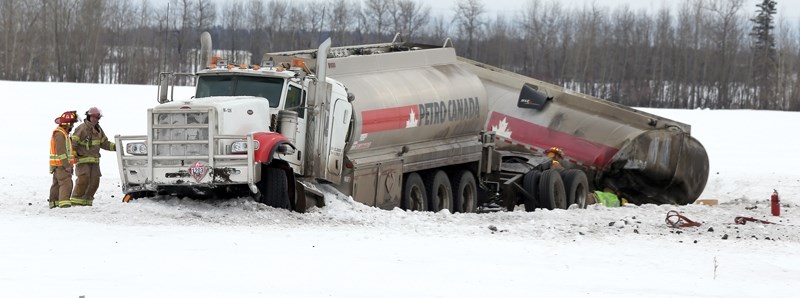Westlock County firefighters had a leaking super B to deal with after a Petro-Canada truck ended up in a field last Wednesday after driving off the road.
The incident occurred at around noon on Feb. 19 along Highway 44 just south of Township 630. A northbound truck carrying diesel fuel slid off the road, said Westlock RCMP Cpl. Lee Grieco-Savoy, and ended up in the field on the east side of the highway.
“We don’t know the cause of the accident,” she said.
The truck driver was “visibly banged up,” Grieco-Savoy said, but otherwise was OK. He was walking around the scene, and was transported to hospital via ambulance.
In driving off the road and coming to a rest in the field, the second trailer became separated from the front end of the truck. The force of the collision also tore a hole in the trailer, causing the diesel fuel to leak out.
Westlock County regional fire chief John Biro said he was unsure how much fuel leaked out of the trailer.
In any collision involving a company vehicle hauling goods, the company usually has procedures in place to clean up the spill, he added.
“The fire department’s main role is to try to contain, and stop if possible, the flow of the product we’re dealing with,” he said.
In the case of this incident, firefighters were working to stem the flow of diesel coming out of a 19-centimetre gash.
“We were just dealing with diesel fuel for the release at the time,” he said. “Diesel fuel is a fairly safe product as long as there’s no fire involved.”
Any time there is a release of chemicals, Biro said the fire department will put its emergency plan into action, which could include closing the highway or evacuating the area.
In this case, with the diesel not at risk of catching fire, the area was not evacuated following the crash. Traffic along the highway was constrained to one lane while firefighters remained on scene.
Petro-Canada crews were on scene fairly quickly, Biro said, and will remain on scene in some form for as long as it takes to clean up the spill.
Although the specifics of the cleanup depend on the amount of diesel spilled, as well as how it came to rest on and in the ground, he said the general process involves removing contaminated soil and either cleaning it or replacing it with fresh soil.
“It’s basically reclamation,” he said.
“They have to bring it back to what it was.”



